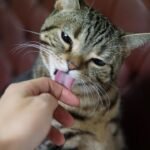Ever wonder if your feline friend sees you as more than just a can opener with opposites thumbs? The truth might surprise you. Studies have shown cats reduce stress and blood pressure levels in their owners. Additionally, research shows ESAs can lower anxiety, reduce depression, decrease feelings of loneliness, and may even offer benefits to those with PTSD. Though what’s less talked about is how much our cats might be depending on us for their own emotional well-being.
The majority of cats are looking to their owners to be a source of safety and security, according to recent research. Your cat isn’t just living with you for the premium kibble and warm lap. They’re forming genuine emotional bonds that mirror the attachments we see between parents and children. So let’s dive into the fascinating world of feline emotional dependence and discover if your whiskered companion truly considers you their emotional anchor.
They Always Know When You Need Comfort

Have you ever noticed how your cat seems to appear out of nowhere when you’re having a rough day? If you’re crying or speaking in a lower tone, your cat might meow softly or rub against your leg. This isn’t coincidence at all.
Research has shown that cats can integrate both visual and auditory signals to interpret human emotions, changing their behavior accordingly based on the emotion(s) that they are detecting. Your cat has become an expert at reading your emotional state, picking up on subtle changes in your voice, posture, and energy levels.
Your Cat Seeks You Out During Stressful Moments

If your cat scurries away during a thunderstorm, then creeps out moments later only to hop onto your lap, it’s a clue you’ve become a safe space. This behavior reveals something profound about your relationship.
When faced with scary or overwhelming situations, emotionally dependent cats don’t just hide under the bed indefinitely. They actively seek out their human for comfort and reassurance. When humans are feeling down or anxious, cats may become more clingy, following their owners around or seeking physical contact, such as curling up next to or on their owner’s lap.
Following You Like a Furry Shadow

Cats often show their love by simply being near you. If your cat chooses to sit on your lap, sleep beside you, or follow you around the house, it’s a clear indication that they enjoy your company. But there’s more to this behavior than simple affection.
A cat who follows you from room to room is demonstrating something called proximity-seeking behavior. The “cat’s need for owner proximity” is actually one of the key factors researchers use to identify emotionally dependent cats. Your bathroom visits have become supervised because your cat genuinely feels more secure when you’re nearby.
Excessive Vocalization When You’re Away

Does your cat meow incessantly when you leave for work, according to your neighbors? Cats don’t typically meow to communicate with other cats; they reserve this behavior for interacting with humans. If your cat frequently meows at you, especially with a soft, gentle tone, it’s their way of getting your attention and showing affection.
However, when this vocalization becomes frantic or distressed during your absence, it often signals separation anxiety. Your cat has developed such a strong emotional dependence on your presence that being alone becomes genuinely stressful for them.
Sleeping Directly on Your Body

Sure, you might be warm and comfortable, but there’s deeper psychology at work when your cat insists on sleeping directly on your chest or curled up against your side. When your cat kneads you, it’s a sign of comfort and trust.
Cats who are emotionally dependent often choose to sleep in direct physical contact rather than simply nearby. They’re not just seeking warmth, they’re seeking the emotional security that comes from feeling your heartbeat and breathing patterns while they’re at their most vulnerable.
Bringing You “Gifts” Regularly

While it might be unpleasant to find a dead mouse or bird at your doorstep, this behavior is a sign of love and trust from your cat. In the wild, cats bring prey to their families. By bringing you gifts, your cat is sharing its “hunt” with you, showing that they consider you part of their family.
Emotionally dependent cats take this behavior to another level, often bringing multiple gifts or even non-prey items like toys, leaves, or random household objects. They’re actively trying to contribute to your shared household and demonstrate their value in the relationship.
Intense Grooming Sessions on Your Hair or Hands

When cats groom each other, it’s a social bonding activity. If your cat licks you, they’re extending that same camaraderie to you. Yet when this grooming becomes persistent and focused, it signals something deeper.
Furthermore, cats are emotionally sensitive, tuned in to their owner’s feelings, you’ll find your cat licking you to soothe your anxiety throughout illness or tough times. Your cat isn’t just keeping you clean, they’re actively trying to care for you emotionally, much like a parent would comfort a distressed child.
Becoming Distressed When Your Routine Changes

Emotionally dependent cats often struggle more intensely with changes to your daily routine. They’ve synchronized their entire emotional well-being around your predictable presence and behaviors. When you suddenly start working different hours or travel unexpectedly, their distress goes beyond simple confusion.
These cats might stop eating, hide for extended periods, or exhibit destructive behaviors. Research suggests that different relationship patterns exist between cats and owners, with some characterized by varying levels of emotional investment and proximity needs. Your schedule disruptions genuinely impact their emotional stability.
Refusing Comfort from Other Family Members

Some cats are definitely one-person pets. To them, other people either don’t exist or are beings to be feared. If your cat consistently seeks you out for comfort while ignoring or avoiding other household members, this exclusivity suggests emotional dependence.
While other family members might provide food or basic care, your emotionally dependent cat has designated you as their primary source of security and comfort. They’ve formed what researchers call a selective attachment bond that mirrors the intense connections seen in human relationships.
Mirroring Your Emotional States

They respond to anxiety or depression with extra cuddles, energy mirroring, vocalizations, and protective behavior. Your cat doesn’t just recognize your emotions, they often begin to mirror them in their own behavior patterns.
When you’re anxious, your emotionally dependent cat might become restless or clingy. When you’re sad, they might become unusually quiet and gentle. Your cat will often act in accordance with the visual and auditory cues that you are giving off, such as crying or anxious motion, and they will change their behavior correspondingly. This may be done because your behavior is stressing out your cat as they interpret your emotions, or because your cat genuinely wants you to return to a happier state.
Conclusion

Recognizing these signs doesn’t mean your cat is unhealthily dependent, rather it highlights the remarkable emotional intelligence and capacity for bonding that our feline companions possess. The research, published in the journal Current Biology, found that cats form attachments to their owners that are similar to those that dogs and even babies form with their caregivers.
Your cat’s emotional dependence on you is actually a testament to the strength of your bond together. The calming and stress-relieving effects of cuddling and stroking a happy, purring kitty have been known for ages but have also been tried and tested by millions of pet parents. A soothing presence as a calming companion is exactly what emotional support animals are for. The relationship works both ways, with you and your cat providing mutual emotional support in your daily lives.
What do you think about your cat’s emotional dependence on you? Have you noticed these signs in your own feline companion?






